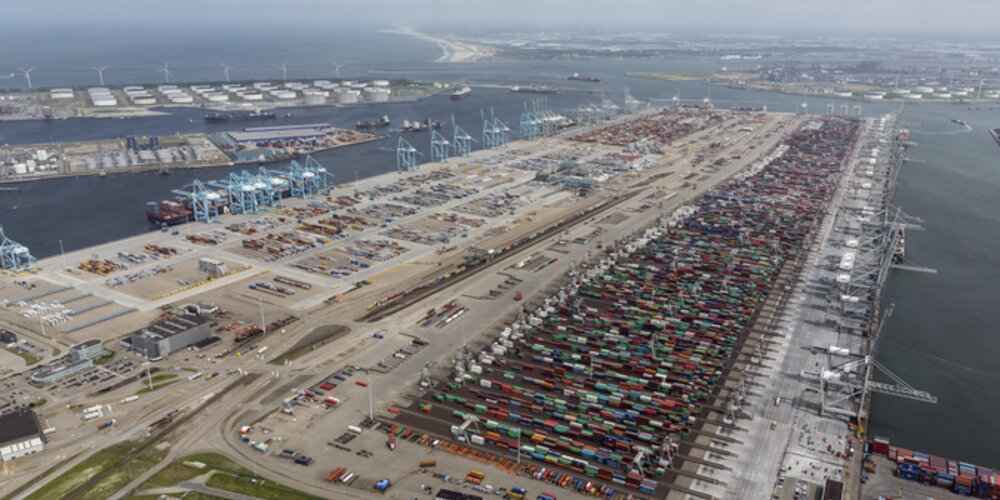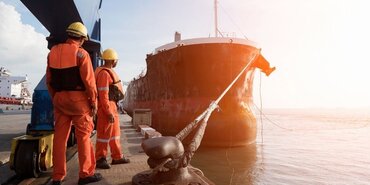TT Talk -Valuing good housekeeping in ports and terminals

With ever increasing operational and financial pressures placed on ports and terminals, whether it be to reduce costs, increase throughput and productivity, or simply deal with demand peaks and troughs, housekeeping may be considered a fairly non-controversial topic and certainly not one that would feature on the priority list… perhaps it should.
Good housekeeping practice not only directly affects physical safety, but also supports effective operational management. In its simplest form reducing the risk of slips, trips and falls (such as by removing potential trip hazards), through to the less quantifiable benefits of building a total workforce culture that strives for the highest standards in everything it does (such as encouraging innovation or maintaining lively feedback loops).
Good housekeeping practice not only directly affects physical safety, but also supports effective operational management
Good housekeeping extends beyond simple cleanliness. The general benefits of neat and orderly work environments may be obvious, but effective containment and removal of waste or keeping on top of foliage growth will almost certainly mitigate broader risks.
Unlike some safety and security solutions, good housekeeping does not inevitably require significant investment. Indeed, engendering a disciplined approach across all the workforce and visitors to the site should allow this activity to be sustained as an integral part of the working life, without necessarily incurring additional cost.
Essentially, good housekeeping can help to control, reduce or eliminate workplace hazards. While something like a build-up of litter in outside areas may not present an immediate risk to safety, accepting it as a norm may lead to a culture where higher threshold safety concerns are taken for granted too.
Customers, risk assessors, accident investigators and authorities, amongst others, will form first impressions of an operation through what they see on site. While they will hardly expect to see sparkling clean yard surfaces, excess litter, trip hazards, broken pallets or dunnage, discarded security seals or broken signage will declare much about the facility’s safety culture.
Public perception
Many port and terminal operations remain in the public eye, whether through direct access to parts of the site, co-location with other public spaces or scrutiny of the operational impacts on the local hinterland. Maintaining a positive public perception can be an important factor.
As an industrial site, the facility may be seen by some as an eyesore; avoiding build-up of litter or debris in and around the site may assist. Recognising the risk of wind, particularly around coastal areas, you should be alert that once litter is dropped, it will naturally gather in particular locations on site unless proactively maintained.
Fire risk
An often-overlooked benefit of good housekeeping is the positive impact on fire risk. A significant proportion of commercial building fires are intentionally started through acts of arson. Minimising the collection of combustibles, whether waste or production materials, particularly in close vicinity to buildings is clearly advisable. Pallets and dunnaging, whether waiting for use, disposal or waste collection can be problematic and require close attention.
Operators should also consider areas dedicated for smoking. Where are these areas positioned, are they next to buildings or adjacent to collections of refuse? Adequate provision to extinguish smoking materials will be required, as well as regular cleaning to prevent build-up of any combustibles in such areas.
Good housekeeping can also support suppression and reduction of potentially flammable dust, and any associated explosion risks. Maintenance of ventilation systems and regular sweeping of operational areas will both assist.
Security risk
Housekeeping is not simply about managing litter and debris on site. Many ports and terminals will have foliage and green areas that also need careful management; growth of foliage, particularly around perimeter areas, may compromise security. For example, consider the placement of CCTV systems; may the tree or plant growth block line of sight?
Be aware that plant growth may also trigger false security alerts. If this is not resolved, security workforce may cease to respond to such alerts, making the site vulnerable when a real threat manifests.
Third-party influence
Where a site is either shared or regularly used by third parties (contractors or visitors), good housekeeping will positively influence their behaviours while on site. Many different contractors might expect to work in a port or terminal from mechanics, cleaning personnel through to temporary equipment operators and third-party truckers.
A well-kept facility will generate expectations to follow rules and procedures, alongside the permanent workforce. Providing a clean, tidy site will support broader safety objectives relating to third parties on site.
A well-kept facility will generate expectations to follow rules and procedures
Operational safety
Considering the general layout of the workplace is an extension of good housekeeping. Monitored procedures, one-way traffic flows and clear segregation markings can all mitigate risks relating to pedestrian-vehicle collisions. It is also important to consider whether storage areas are sufficient, or whether tools and stock routinely overflow.
Safety and efficiency generally flow from a clean and tidy environment. Removal of slip, trip and fall hazards is elemental, but recognise too the benefits of building pride in knowing ones place in an operation and by articulating clear expectations of the workforce. Where good housekeeping culture becomes ingrained, fewer safety incidents and improved morale follow.
Safety and efficiency generally flow from a clean and tidy environment
Solid housekeeping regimes are also likely to deliver efficiencies and improved productivity. This may be accomplished by reducing time spent working around waste and build-up of debris. Similarly, deliberate controls and maintenance of tools, equipment, materials and work areas will reduce wasted time and resources. Furthermore, increased levels of hygiene in the workplace may mitigate the risk of illness and sick leave – and enhance mental wellbeing.
While periodic ‘deep cleans’ may rightly be part of an operation’s strategy, the benefits of good housekeeping as an established culture in everyday operations, the bedrock of activity, are multifarious.
-
If you would like further information, or have any comments, please email us, or take this opportunity to forward to any others who you may feel would be interested.
Documents
TT Talk 295 Chinese Translation (579 kB) 27/02/2023
- Author
- Mike Yarwood
- Date
- 07/02/2023





